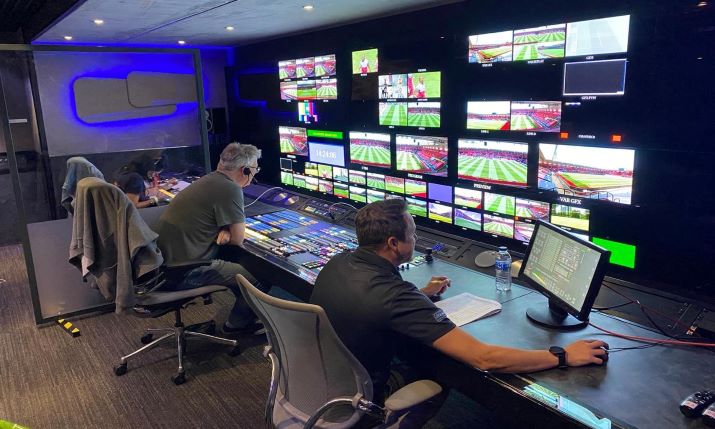COVID-19 crisis accelerates innovation for rapid pace of change

EMG has helped with the speed of innovation in 2020 with the its UK ROC in High Wycombe, shown here on 5 July 2020 for the Southampton v Manchester City match directed by Andrew Clement of BBC Sport
By Patrick van den Berg, co-CEO, Euro Media Group
While the COVID-19 global pandemic has been an enormous challenge for our industry, it has also brought a number of very positive changes and innovations. The shift towards new industry standards, such as the use of remote technologies, was already at play prior to COVID-19, but this crisis has dramatically accelerated the pace of change in a number of areas.
For broadcast technology providers, many business-as-usual approaches to serving our clients, collaborating with colleagues, or just getting anything done, had to change if we wanted to continue delivering to the highest standards. We had to imagine new workflows and accelerate the scope and scale of innovation. And it worked.
Across the whole industry we have seen change in the past seven-plus months unlike anything we have seen before, at an incredible pace.
Accelerated transition
While the shift towards IP and remote technologies was very much on the agenda for the entire industry, the challenge was to gain the confidence of production and operational teams to adopt these technological trajectories. COVID-19 has accelerated that step of the process. Across our industry, while most sports events were cancelled in March and April, ‘legacy broadcast’ teams worked closely with their CTOs requesting to use this ‘down-time’ for training on IP-based systems and more IT-centric approaches.
Our traditional broadcast engineers and operators have learned new IT skills; something which would have normally taken some time has now been accomplished in only a few months, largely driven by necessity. For clients, the use of remote technologies was not an option, remote solutions had become THE answer to many of their challenges.
The pandemic forced our industry to increase collaboration and productivity. During the first lockdown, EMG UK built its first Remote Operation Centre (ROC) in no more than four weeks, something which would have otherwise been unthinkable within such a condensed timescale. In many ways, COVID-19 has accelerated the future that was happening anyway, probably for the best.
A positive impact on sustainability
The rapid implementation of remote technologies immediately saved thousands of crew travel miles for every event. This also contributed to the reduction in the amount of equipment that is moved around. There is no denying that doing everything we can to reduce carbon emissions is an absolute necessity in the world we are living in. Research into the carbon footprint of sports TV production and outside broadcasting shows that travel and energy use are two of the areas that require improvement. Prior to COVID-19, of all the measures we had lined up in front of us to reduce our environmental impact, a quick transition to remote technologies was the most impactful one. While we knew this would happen eventually, the progress we’ve made in 2020 really is something we should celebrate and we should keep in mind that quick change towards a more sustainable future is possible when we all put our minds and energy to it.
While multiplying Remote Operation Centres has been a major milestone, COVID-19 has also shown that we can push remote production even further. Many companies have looked into the possibility of creating operational hubs in parts of the country where the operational teams live, thereby reducing travel even further.
Innovations will be there to last
Overall, 2020 has been a great year for creativity and innovation. Rarely has our industry been pushed to tap into its inner pool of resources by combining its knowledge and insight in extraordinary new ways. Countless new workflows were imagined. In particular, we have invented new ways to engage sport fans. To do so, we’ve brought digital technologies such as augmented reality to the forefront to simulate public presence in stadiums.
Companies like EMG’s On Rewind have found new ways to engage sports fans so they don’t have to watch a match passively but instead can directly engage with the content via an interactive video player and harness the power of social media to allow fans to share a match with their friends, even during a lockdown. While we all hope that after this pandemic, stadiums will again be filled with happy crowds of fans, these innovations will keep benefitting those who will watch a match from home. By bringing fan engagement to the forefront of the sports industry, this pandemic has paved the way for new upcoming innovations and we can soon imagine that mixed and virtual reality will gain traction in a post COVID-19 world, opening a whole new realm of engagement possibilities for sports fans.
All this knowledge, insight, information and inspiration was certainly there before. But, like diamonds, we are shaped and strengthened by the pressures around us. COVID-19 has certainly brought a lot of stress to our industry, but it has made the future happen faster. And that is a good thing.
